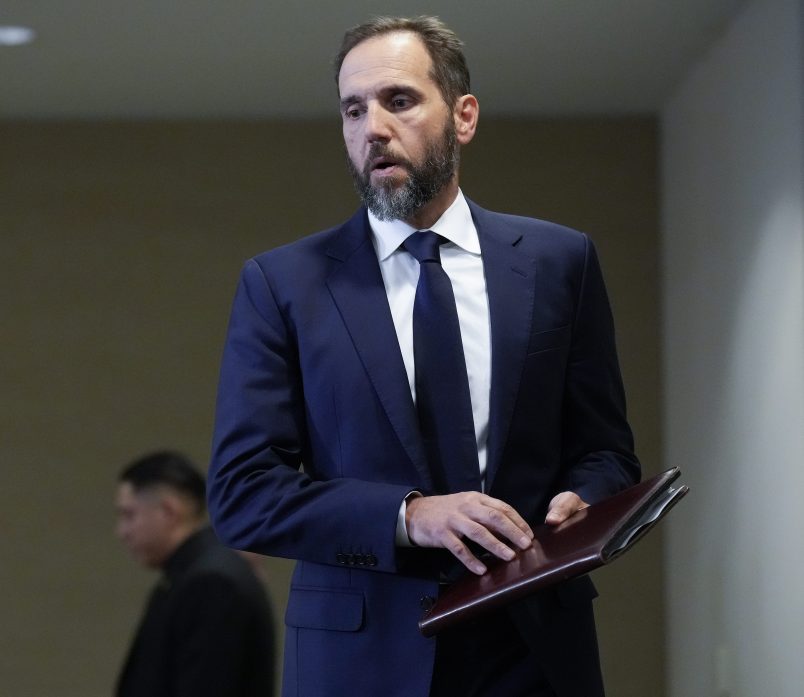Tucked into ex-Special Counsel Jack Smith’s 137-page report on Donald Trump’s 2020 self-coup attempt, he explores a question that’s hung in the background of the case: Why wasn’t Trump ever charged with insurrection?
The question has arisen in the form of honest inquiry, and also as a talking point from some Trump acolytes. For the latter group, it’s part of a broader project seeking to cast the Smith prosecutions as illegitimate and unable to establish the basic facts that supposedly spurred its existence.
In the report, Smith explained that his team viewed charging Trump with insurrection — or incitement to insurrection — was fraught largely because it’s a dramatically unexplored area of American law.
The crime that Smith considered stems from the Insurrection Act, a Civil War-era law that criminalizes “whoever incites, sets on foot, assists, or engages in any rebellion or insurrection against the authority of the United States or the laws thereof, or gives aid or comfort thereto.”
Per the report, Smith’s team felt the reality that the law itself has not been explored in court presented significant problems. Terms like “insurrection” or “incitement to insurrection” are broadly undefined; the law itself has not been charged for more than 100 years, Smith said.
The places that Smith went in his research illustrate the pre-Trump obscurity of it all. He cited cases interpreting the statute that date back to the late 19th century, and appear to mostly deal with ex-Confederates and attempts in the 1890s to obstruct the mail.
In some ways, it overlaps with the challenges litigants trying to use the 14th Amendment’s Insurrection Clause to disqualify Trump from office faced last year: an uncharted legal landscape dominated mostly by 19th century court cases.
In other examples, Smith said that his team combed through court cases to see how different judges had described the events of January 6. He referenced the Colorado Supreme Court’s 2023 ruling which held that Trump was disqualified per the 14th Amendment; that court found that January 6 was an insurrection. Separately, Smith wrote, D.C. judges overseeing January 6 rioter cases have used the term to describe the events of the day, but haven’t applied it in the context of a criminal charge.
He went even further afield in his attempts to nail down a definition of insurrection that might work. Smith cited a series of court cases involving insurance companies and claims over policies that covered “insurrection” in the context of foreign instability. Multinational corporations that had suffered damages due to insurrections overseas had sought claims under the policies, leading to court disputes — and prompting U.S. judges to further define “insurrection,” at least in an insurance context. There, one court came to a conclusion that might protect Trump: insurrection “typically involves overthrowing a sitting government, rather than maintaining power.”
Smith said that further research made the same point: Trump’s self-coup attempt was unique in the historical record. There quite literally were no cases that could serve as a reference point.
“The Office did not find any case in which a criminal defendant was charged with insurrection for acting within the government to maintain power, as opposed to overthrowing it or thwarting it from the outside,” he wrote.
Smith said that, in spite of this all, he believed he likely had the evidence to charge Trump with incitement to insurrection. But even there, he said, there’s no historical record of an incitement to insurrection charge ever having been brought.
Lurking in the background of all this is a potentially hostile Supreme Court. The ex-special counsel indicated that he understood all of the ambiguity and lack of precedent would have given Trump real questions to raise that would have to be litigated further, on appeal and upwards to the high court. He obliquely referred to that as the “litigation risk that would be presented by employing this long-dormant statute.”
Smith’s view of how the Supreme Court ultimately constrained his prosecutions — even without “insurrection” charges — becomes clearer later on in the report. There, he discussed the July 2024 immunity ruling, which revealed the court to be hostile to the Smith cases and which granted Trump nearly blanket immunity for official acts.
“Before this case, no court had ever found that Presidents are immune from criminal responsibility for their official acts, and no text in the Constitution explicitly confers such criminal immunity on the President,” Smith wrote.
Look at what happened with what was understood to be a bedrock principle of the American system: that nobody, not even the president, is above the law. That finding, combined with Trump’s reelection, ultimately ran out the clock on Smith’s prosecution. Why risk an area of law that hasn’t really been explored?







Yes, this was the first time it had ever occurred, that’s why it was important to charge it and get a record for future generations. Now that’s by the board.
The law is an ass.
If administered by asses.
We’ll see. But crimes against humanity are never official acts.
“The bad man desires arbitrary power. What moves the evil man is the love of injustice.” – John Rawls